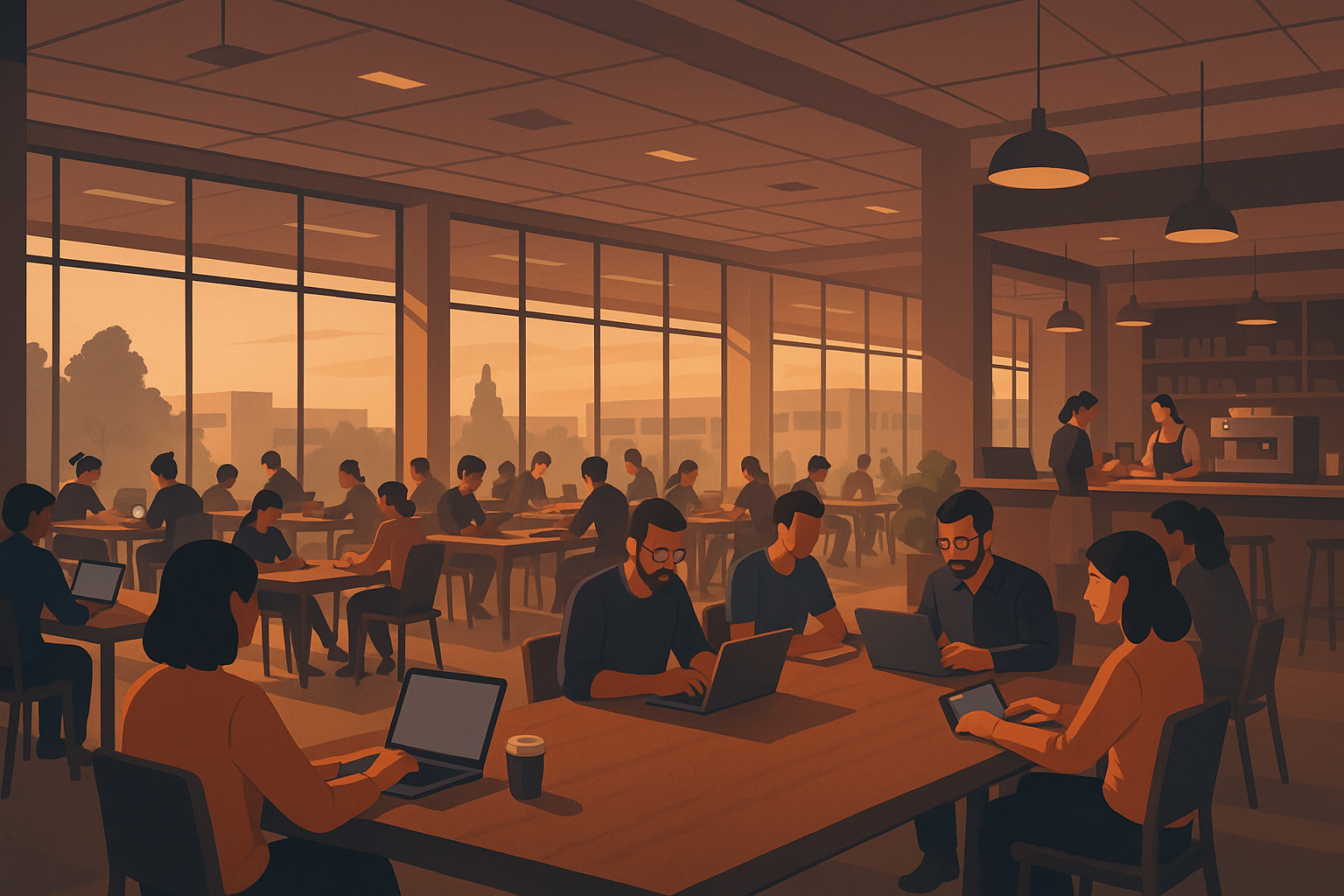A New College
A community campus where adults cowork, eat, host talks, and build real friendships—like a university without classes, designed to defeat Isolation!!
The Idea
We are building something we call a community campus. You can think of it as college without the classes, built for adults who work remotely and are tired of being alone all week. It’s a physical place you can actually show up to every day, do your real job or your real project, sit around other human beings, talk between sprints, get invited to things, and slowly form a friend group without having to force it. It’s work space, hang space, social space, and support structure in one
Right now, most of us are living through a loneliness crisis. We have Discord servers, endless group chats, online gamer friends, and 24/7 content, but we don’t have anyone to spontaneously grab food with on a Tuesday. Remote work sounded like freedom, but what it actually turned into for a lot of people is sitting behind a laptop for 8 to 12 hours at home, alone, barely speaking to anyone in person. You can find meetups and events in your city, sure, but they usually happen once a week or once every two weeks. You show up, talk for a little, and then everyone scatters back into their separate lives. It’s almost impossible to build any kind of real community like that. You don’t get repetition. You don’t get rhythm. You don’t get to actually know people. You feel like a visitor instead of part of something.

The community campus is meant to fix that. The core idea is simple: you should be able to join a place where you can work in person, be around other people who are doing something with their life, and naturally fall into clubs, talks, and social rhythms without it being weird, expensive, or fake. You come in with your laptop and your goals. We supply the environment, the people, and the structure that lets a normal adult actually belong somewhere again.
This is not just a coworking space. Traditional coworking often gives you a desk and silence and that’s it. What we are building is intentionally modeled more like a university campus, except we stripped out the tuition, stripped out the debt, stripped out the lectures you don’t care about, and kept what actually works. On this campus there are quiet rooms for serious work, louder rooms where talking is allowed and ideas are getting thrown around. There’s a cafeteria where you can get a decent, budget-friendly meal or coffee that won’t bankrupt you, because you’re supposed to be able to spend hours here, not just buy one $9 latte and leave. There are rooms you can book to talk to your boss in private or pitch something or meet with your team. There are recurring clubs. There are small talks led by members or guests instead of formal classes. There are game nights, movie nights, “show us what you’re building” nights, and “let’s just be alive in the same room for once” nights. You do your work during the day and you have a social life when you close the laptop, all inside the same physical ecosystem.
We’re very open about this: we didn’t invent the need for this. Colleges and universities already proved this model works. College is controversial now, and honestly, in a lot of cases it deserves that. A lot of people are told “get this degree and you’ll get this career,” and then they go tens or hundreds of thousands of dollars into debt for an outcome that may never show up. The pricing and the sales pitch can be a scam. But you can hate the cost and still admit that college nails two things almost nothing else in adult life gives you. One, it gives you an environment that forces you to take yourself seriously. When you’re on a campus, you’re in a headspace where the expectation is: you build, you train, you level up. You are surrounded by other people doing something. That pressure is good for you. Two, it gives you density of community. You’re never really isolated. You’re surrounded by peers. You’re seen. You’re embarrassed if you’re slacking. You’re proud when you’re doing well. You have someone to get food with without scheduling it two weeks ahead of time. You’re less likely to numb yourself with weed just because you’re bored and alone. You even have organic dating opportunities without relying only on Tinder or walking up to strangers on the street, because when you’re in a community you don’t have to act desperate. You’re already in the mix.
That’s what we’re trying to recreate. That part of college does not have to be tied to tuition, or to a specific major, or to sitting in a lecture hall, or even to being 19 years old. It can exist for adults. It can exist for freelancers, for remote workers, for people building companies, for people figuring it out, for people trying to get unstuck, for people who moved to a new city and have nobody. You don’t need a professor to get that. You just need a shared physical space, a reason to keep showing up, and infrastructure that makes it easy for people to self-organize.
Here’s what that actually looks like in practice. A totally new person walks in. Day one. They don’t know anybody. They start in the free coworking area, which is a little crowded and a little loud and honestly a little rough around the edges. It’s not curated, it’s real. Some people are in calls, some people are brainstorming, some people are blasting through work, some people probably didn’t shower yet. On the wall, this new person sees a flyer for a talk that afternoon: it’s being given by someone who used to run a small business. Not a celebrity. Not some fake guru. A real person who already lived through a thing. So he goes.

At that talk, he doesn’t instantly become best friends with everyone. This is real life, not a trailer for an app. But he does hear about a weekly business club. He finds out they meet in Building C, third floor, Room 311. He finds out there are snacks. He decides to show up. In that club, people are walking through their ideas and giving each other feedback. They’re planning a pitch day where everyone lays out what they’re trying to build and everyone else helps sharpen it. Our new guy is a little ambitious, and even though he’s nervous, he pushes himself and participates. He puts his idea on the table in front of the group. After the meeting, a couple people come up to him and say, “That was actually solid. You should keep going with that. Want to grab food and talk more?” They go out to eat together. Now it’s not just “a room full of strangers.” Now he has names. Now he has people.
After that, something important happens. He decides it’s worth upgrading to a paid membership. Not because somebody pressured him with upsell nonsense, but because the value is obvious. He wants guaranteed seating in the quieter workspace so he’s not hunting for a table every time. He wants access to a space where he can step into a call with his boss without being surrounded by noise. He wants to sit in the same area as the same faces every day instead of drifting like a ghost in a Starbucks. That membership tier gives him access to both quiet rooms and “loud rooms,” meaning one room where you’re expected to keep it focused and mostly silent, and another where conversation and collaboration are allowed and not treated like a problem. He also gets the ability to book full meeting rooms without paying some ridiculous hourly fee. This matters if you’re on salary and don’t want your boss to think you’re unprofessional, or if you’re building something and you need to talk to people in private.
hey’re not in each other’s pockets all day, but they’re not isolated, either. When the workday wraps, they don’t just go home to sit alone with their phone. They might head to the business club meeting, jump into game night, or just walk over to a local brewery and cool off together because it’s been a long week. After all, it’s Friday, and they actually earned that Friday together.

That’s the atmosphere we’re building. It’s basically a college campus where, instead of doing homework and sitting through Gen Ed classes you don’t care about, you’re doing your real job or your real project. Instead of being 18 and surrounded by other 18-year-olds, you might be 24, 29, 37, whatever. You’re not paying tuition. You’re not going into debt. You’re not asking permission to belong. You simply participate. You work. You show up for people and they show up for you.
Now, let’s talk about money, because if this can’t pay for itself in a sustainable way, it doesn’t get to exist. The economics of a community campus are built around one idea: the many should be able to afford this, and a small number of people with more resources will carry extra weight on purpose. There will be a free or extremely low-cost layer, because this only works if ambitious, interesting, early-stage, figuring-it-out people can actually get in the door and start forming connections without a financial gate right away. On top of that there will be a normal membership tier, which gives you reliable seating, access to the quiet and loud work rooms, the ability to reserve meeting rooms, and the ability to treat this place like your default work/home base instead of gambling on coffee shops.
Then there’s the premium tier. This is basically a patron tier. It is intentionally priced higher, and it’s built for people who want comfort, privacy, predictability, and maybe status perks like a nicer lounge, priority room booking, concierge-style help, and so on. But here’s the important part: people in that tier are not just buying themselves a nicer chair. They are basically acting as donors. Their money is used to help keep the lower tiers affordable, to keep the free layer alive, and to protect the culture we’re talking about. So yes, the premium tier has to feel worth it and genuinely serve those members. But it is also understood that part of what they’re paying for is impact. They are keeping the doors open for people who are talented, hungry, and early, not just people who are already established.
There are other funding sources too. The cafeteria matters, because good, inexpensive food keeps people in the building longer and makes it reasonable to spend major chunks of your week here. That revenue helps. There’s also public money. Cities constantly talk about “economic development,” “keeping talent local,” “supporting young professionals,” “reducing crime through stability,” “making remote workers spend money locally instead of just online,” and “preventing mental health collapse through community instead of emergency response.” A functioning community campus hits all of that at once. If we can prove demand, we can take this model to city governments, foundations, and people with serious philanthropic wallets and say: help us get the first one in the ground, because this is workforce infrastructure, social infrastructure, and mental health infrastructure disguised as a place with tables and coffee.
And yes, I’m direct about this next part. I don’t mind if a little less money goes to bloated, underperforming parts of the old college system and instead goes into building this. I don’t mind if public universities feel pressure and decide to copy the model and try to do it better. Good. Compete. The goal is not to worship higher education as it exists. The goal is to bring the parts that work — focus, community, upward pressure, shared identity — to normal adults without asking them to take on debt or enlist in the military.
The last thing you should know is how this actually becomes real. A space like this requires someone with money to believe in it. That usually means someone who’s willing to treat this like a charitable investment at first, not just a business line item. That person has to accept risk and care more about changing lives in their city than about squeezing the maximum profit per square foot. You might not personally have that level of capital, and that’s fine. What you do have is signal. Signal is powerful. If you’re reading this and thinking, “I want this near me. I would actually go. I would work here instead of working alone. I would join the clubs. I would show up to the talks. I would bring my friends,” I need you to say so. I’m not asking you for money up front. I’m asking you to add your name and tell us what city you’re in.
That’s because data is leverage. If we can walk into a conversation with someone who controls serious money and put down proof that there are hundreds or thousands of real people in a specific city asking for a community campus, that is how you unlock doors. That is how you get a building. That is how you get the first cafeteria. That is how you get the rooms on the third floor, Room 311, where the Wednesday night business club actually happens and where some nervous, ambitious person goes from “just some dude in a loud room” to “part of something.”
The question we’re asking you is simple: do you want this? Do you want a place in your city where you can work in person, be known, feel safe, have people to grow with, and not be lonely? Do you want a version of adult life that doesn’t depend on swiping for strangers or drinking just to have company? Do you want the benefits of a university community without being sold a degree you don’t need? Tell us. Because if the modern generation is foaming at the mouth for this, we’ll have the proof we need to build it. And if everyone reads this and says “no, actually this is dystopian and we hate it,” then we should also know that now, before we waste anyone’s time.
That’s what “About Us” means here. We’re not promising to fix your whole life. We’re promising to build a place where it becomes normal to not be alone.

contact me at anthonycavuoti@gmail.com